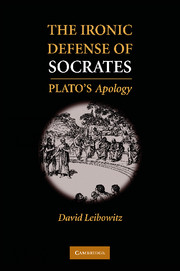Book contents
- Frontmatter
- Contents
- Acknowledgments
- Introduction
- 1 Title and Preliminary Considerations
- 2 Prooemium (17a1–18a6)
- 3 Prothesis (18a7–19a7)
- 4 Defense against the Charges of the First Accusers (19a8–24b2)
- 5 Defense against the Present Accusers (24b3–28b2)
- 6 Second Digression (28b3–34b5)
- 7 Epilogue (34b6–35d8)
- 8 Penalty Section (35e1–38b9)
- 9 Final Speech (38c1–42a5)
- 10 Conclusion
- Short Titles
- Bibliography
- Index
6 - Second Digression (28b3–34b5)
Published online by Cambridge University Press: 05 August 2011
- Frontmatter
- Contents
- Acknowledgments
- Introduction
- 1 Title and Preliminary Considerations
- 2 Prooemium (17a1–18a6)
- 3 Prothesis (18a7–19a7)
- 4 Defense against the Charges of the First Accusers (19a8–24b2)
- 5 Defense against the Present Accusers (24b3–28b2)
- 6 Second Digression (28b3–34b5)
- 7 Epilogue (34b6–35d8)
- 8 Penalty Section (35e1–38b9)
- 9 Final Speech (38c1–42a5)
- 10 Conclusion
- Short Titles
- Bibliography
- Index
Summary
Nobility and Death (28b3–33a1)
After his refutation of Meletus, Socrates enters into a long digression on his way of life in which the principal themes are nobility and death, a natural pair. The digression begins with a question. Someone, he says, might perhaps ask, “Then aren't you ashamed, Socrates, of having followed the sort of pursuit from which you now run the risk of dying?” (28b3–5). In other words, even if you are innocent, isn't it shameful to have pursued a life that renders you unable to protect or defend yourself, that may in fact lead to your destruction (cf. 17c7–d1 with Xenophon, Memorabilia 4.8.4 and Oeconomicus 11.22–24)? This recalls the question, raised after Socrates' refutation of the charges of the first accusers, that launched his earlier digression. One of you, he said then, might ask: if you have done nothing unusual, or more unusual than “the others,” Socrates, why are you in so much trouble? (20c4–d1). That, he said, was a just question, and his answer, although perhaps playful, would be true. The answer took the form of a story about the Delphic oracle and the consequences of Socrates' efforts to confirm the nonexistence of superhuman wisdom. As Strauss observes, the second digression “continues, deepens, modifies the first” (“Apology,” 44). This time he says that his answer will be just – he is silent about whether it will also be true – but he characterizes the question itself as shameful.
- Type
- Chapter
- Information
- The Ironic Defense of SocratesPlato's Apology, pp. 137 - 153Publisher: Cambridge University PressPrint publication year: 2010



